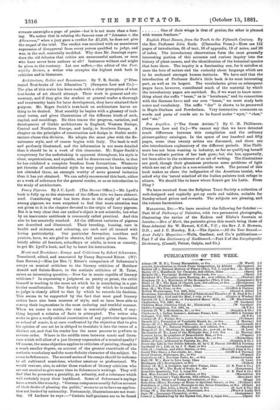Music and Musicians : Essays and Criticisms by Robert Schumann.
Translated, edited, and annotated by Fanny Raymond Ritter. (Wi!- Ham Reeves.)—Miss (or Mrs. ?) Ritter's comparison of Schumann's essays on musical criticism to the literary criticism of Matthew Arnold and Sainte-Benve, to the wsthetic criticism of M. Taine, raises an interesting question,—How far is music capable of literary criticism ? In expressing a judgment on poetry or prose, the critic himself is working in the same art which he is considering in a par- ticular manifestation. The faculty or skill by which he is enabled to judge is closely allied to that by which he records his decision. This seems to be supported by the fact that most good literary critics have also been masters of style, and so have been able to convey their impressions in the most enduring and truthful manner. When we come to music, the case is materially altered, if any- thing beyond a relation of facts is attempted. The writer who seeks to give a really critical examination of any particular specimen or school of music, is at once confronted by the objection that to give his opinion of one art he is obliged to translate it into the terms of a distinct art, and that his reader has the same process to perform in reverse order. Where is the middle term between music and litera- ture which will allow of a just literary expression of a musical quality ? Of course, the same objection applies to criticism of painting, though to a much smaller degree, on account of the greater exactitude of the resthetic vocabulary and the more definite character of the subject. To come to Schumann. The second series of his essays should be welcome to all cultivated musicians, whether amateur or professional. We would venture, also, to advise those readers of literary criticism who are not musical to give some time to Schumann's writings. They will find that he possesses a geniality, an urbanity, and a tolerance which will certainly repay their hardihood. Some of Schumann's sayings have a truth-like tenacity. "German composers usually fail on account of their desire of pleasing the public," seems to us to have an applica- tion not limited by nationality. Fortunately, illustrations are not want- ing. Of Lackner he says :—" Certain half-geniuses are to be found
One of their wings is that of genius, the other is plumed with waxen feathers."


































 Previous page
Previous page